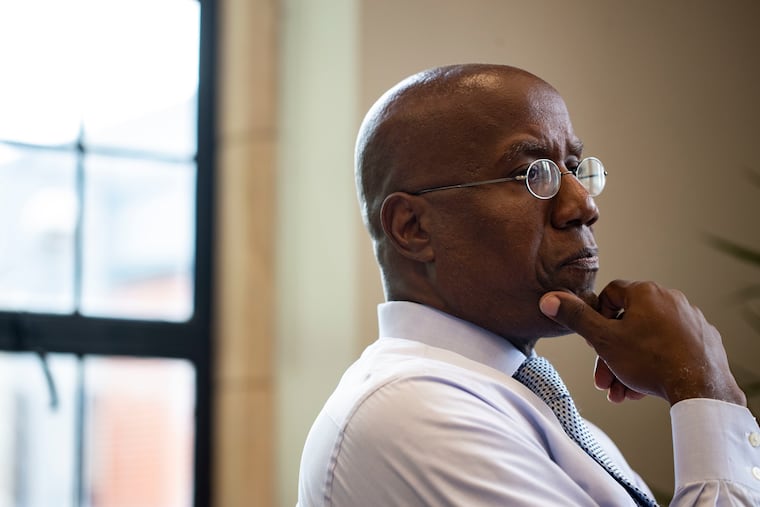Did race play a role in former Temple president Jason Wingard’s ‘fall from grace’? For many in Philly’s Black community, the answer is yes.
Was Temple's first Black president under more scrutiny than his predecessors? Did he have to be twice as good?

The abrupt end to Jason Wingard’s presidency, the shortest tenure in Temple University’s 138-year history, has called attention to the elephant in the room.
Did race play a role in the fall of the university’s first Black president?
The short answer, for many members of the Black community, is “yes.”
“When the fanfare ends about being ‘first’, you have to deal with what they end up walking into,” said Sidney Hargro, executive director of LeadersTrust, a nonprofit leadership development organization. “Too often when a ‘first’ is hired, things are tattered and broken, so they have to come in thankful for the opportunity but they don’t have the space to deal with what is broken.”
“The reality of race is that you walk into a situation [and] the clock is ticking to show you actually belong,” he said.
“The reality of race is that you walk into a situation [and] the clock is ticking to show you actually belong.”
Jacqueline Wiggins, a longtime North Central Philadelphia community activist, agrees. “There is always a different expectation of outcomes when Black folks assume leadership positions. It’s unfair,” she said.
» READ MORE: Temple hires Chestnut Hill resident and former Ivy League school dean as its next president
Wingard was hired to be Temple’s external face focused on fundraising and building the school’s endowment, according to the announcement heralding his hire in July 2021.
Kimmika Williams-Witherspoon, Faculty Senate president and associate professor of theater studies and playwriting, told The Inquirer that Wingard was in fact doing what he was tasked to do.
“Some individuals are held to a higher standard than others. And the expectations are different,” she said.
‘He came into a mess’
Wingard was done in by internal crises including falling enrollment, growing concerns about public safety after the fatal shooting of a Temple University Police sergeant, as well as a 42-day bitter strike with the Temple University Graduate Students’ Association (TUGSA).
“He came into a mess — union issues, enrollment, crime. He needed time to form and cultivate relationships.”
“Wingard was only here for 18 months. He came into a mess — union issues, enrollment, crime. He needed time to form and cultivate relationships,” Wiggins said.
“It is fair to raise the question about whether there was a racial component,” said George Burrell, Of Counsel member of Kleinbard’s business and finance department and former at-large member of Philadelphia City Council. “Wingard was pursuing his vision and the board approved that when they hired him.”
“But he isn’t entitled to a pass just because he is Black,” he added.
For Yumy Odom, the former director of the Pan African Studies Community Education Program (PASCEP) at Temple Universitythe question is simpler:“What did he do in two years that was so bad?”
Conducting a no-confidence vote
Temple Association of University Professionals (TAUP), the faculty union, cites a list of complaints including hiring concerns; public-safety worries; problems in the offices of ethics, compliance, and research; and Wingard’s lack of on-campus visibility.
At least 20% of bargaining unit members had to agree to conducting a no-confidence vote for the effort to go forward.
“My vote was a single-issue vote,” said one Black faculty member who voted in favor of holding a no-confidence vote. “It was about how he treated JoAnne Epps. She was the first Black female provost. She is a ranking Black administrator, and he sacks JoAnne.” Concerned about retribution, the faculty member requested to remain anonymous.
» READ MORE: Upheaval at Temple: JoAnne Epps out as provost, four others moved out, too
In an administrative shake-up, two months into his tenure, Wingard ousted Epps, who had been provost, the school’s chief academic officer, since 2016. She was replaced by current provost Gregory Mandel.
“That said, he is being blamed for a lot of stuff for which he is not blameworthy,” the faculty member continued.
Although Wingard has resigned, Mitchell Morgan, chair of the board of trustees, and Mandel were also named in the no-confidence procedure. TAUP has scheduled the no-confidence vote for the week of April 10.
Hargro said that boards of white institutions that are hiring their first BIPOC leaders have an obligation to ask hard questions.
“No one can successfully argue that no Black or brown person has been qualified over 130 years,” he said. “What is the work the institution needs to do to integrate? Why has it taken so long?”